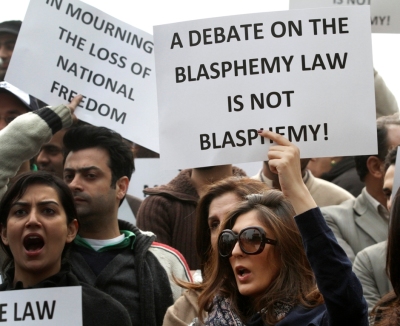Family of Pakistani Christian sentenced to death on blasphemy charge goes into hiding

Fearing attacks, the wife and three children of a Christian man in Pakistan have gone into hiding after a court sentenced him to death for sending a “blasphemous” text message seven years ago.
“She is in hiding because she feels threatened. She is trying to keep her three sons and daughter safe,” Release International, an organization that supports persecuted Christians, said, referring to the wife of Asif Pervaiz, according to the U.S.-based persecution watchdog International Christian Concern.
Pervaiz was given the death sentence by a ruling of a court in the Punjab province’s capital of Lahore on Sept. 8. A Muslim man, identified as Saeed Ahmeed Khokar, accused Pervaiz of sending him blasphemous text messages from his mobile phone on Oct. 2, 2013.
“The evidence on record was clearly not enough to sentence Asif Pervaiz to death. As usual, trial judges have so far never acquitted anyone accused of blasphemy,” Pervaiz’s attorney, Saif-ul Malook, told Christian Solidarity Worldwide after the conviction. “I hope he will be freed by the High Court where we have filed an appeal. Sadly, Asif will continue to be incarcerated until his appeal is heard.”
When Pervaiz learned about the charges, he also had to go into hiding. Police then reportedly threatened his mother that they would kill Pervaiz when they found him unless she helped them locate her son. He was arrested a week later.
Pervaiz and the Muslim complainant worked together at a garments factory, and Khokar would often pressure Pervaiz to convert to Islam. And before the alleged blasphemous text messages were sent from his phone, Pervaiz lost his SIM card but failed to request the service provider to deactivate it.
Pervaiz’s family believes that Khokar used the lost SIM card to send the text messages that he used to register a false accusation against Pervaiz.
Malook previously represented Asia Bibi, a Pakistani Christian mother who was acquitted by Pakistan’s Supreme Court in 2018 after spending nearly a decade on death row for allegedly insulting Islam. Her case garnered international attention and scrutiny toward the country’s blasphemy laws.
“From my experience in the Asia Bibi case, judges in appeal courts hesitate to hear and decide blasphemy cases,” Malook noted. “Cases involving murder are usually decided within three years, but blasphemy charges can take up to over seven years.”
Christians are often targeted both by Pakistan’s blasphemy laws meant to protect Islamic sensitivities and by hardliners who carry out violence and have killed scores of believers in the past several years.
The blasphemy law, embedded in Sections 295 and 298 of the Pakistan Penal Code, is frequently misused for personal revenge. It carries no provision to punish a false accuser or a false witness of blasphemy.
The law is also used by Islamist extremists to target religious minorities — Christians, Shi’as, Ahmadiyyas and Hindus.
Pakistan is ranked as the fifth worst country in the world when it comes to Christian persecution, according to Open Doors USA’s 2020 World Watch List.
At the U.S. State Department’s 2019 Ministerial to Advance Religious Freedom, Pakistani rights activist Shaan Taseer said that there are as many as 200 people jailed in Pakistan on blasphemy charges.



























